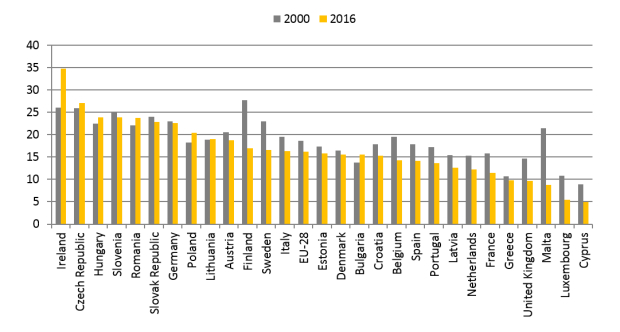New elements in renewed EU Industrial Policy Strategy
27 September 2017
The EU’s recently published ‘Renewed Industrial Policy Strategy’ points towards important issues on top of strengthening competitiveness. A commentary by Robert Stehrer.
Photo: Car manufacturing, iStock.com/RainerPlendl
- On 13 September the European Commission presented a communication on its Industrial Policy called ‘Investing in a smart, innovative and sustainable industry – A renewed EU Industrial Policy Strategy’, pointing towards competitiveness challenges in the face of new technologies and global developments.
- Though sticking to the horizontal approach, it rightly emphasises the need for national and regional efforts to strengthen industrial competitiveness.
- In times of rising protectionism it highlights the importance of rules-based and fair trade, but argues for strengthening trade defence measures and hindering inward FDI in strategic areas.
- Though not being the main focus, more awareness is given to the needs of and assistance for potential losers to smooth the structural changes and transformations ahead and spread the benefits to all.
On 13 September 2017 the European Commission presented a new communication on its Industrial Policy called ‘Investing in a smart, innovative and sustainable industry – A renewed EU Industrial Policy Strategy’. This follows a number of other communications on Industrial Policy in the years 2010, 2012 and 2014. Again this communication stresses the important role of manufacturing for innovation and productivity growth with a strong focus on technological developments in the ‘new industrial age’ such as digitisation and automation. Further it emphasises Europe’s role in moving towards an environmentally sustainable and resource-efficient economy.
A couple of main elements are stressed, underpinning the horizontal nature of industrial policy and a holistic approach. These main elements are seen in the area of cybersecurity, the enhancement of the free flow of non-personal data, actions on the circular economy, modernisation of the Intellectual Policy Framework, improvement in public procurement in the EU, and the extension of the EU skills agenda. The communication further emphasises the role of sustainable finance, trade policy issues, the supply of critical raw materials and suggestions for further pushing environmental standards.
Though also mentioned in previous communications, the role of Member States, regions, cities and the private sector is strongly emphasised. Enhancing and deepening the single market agenda is still at the forefront of the EU policy approach. Steps in this direction are also called for at the Member State level. However, the need to address regional challenges and support regional development with ‘tailor-made and joined-up support’ rather than the application of a ‘one-size-fits-all approach’ is rightly stressed. This is indicated by the fact that the size of the ‘manufacturing base’ and its development – as a share of manufacturing in total GDP – differ widely across countries and have developed differently over time which has driven structural imbalances across Europe.
Share of manufacturing in GDP, in %
In times of increasing protectionism the communication calls for open and rules-based trade which needs to be fair and sustainable. Emphasising the benefits and opportunities of internationalisation for the EU, it points to the importance of fair rules across all partners and suggests a stronger role of trade defence instruments, anti-dumping strategies and promotion of mutual market access (particularly in the area of public procurement). It however also acknowledges the challenge of strategic foreign investments in the EU which might lead to take-overs in areas with key-enabling technologies or threaten security and public order. A screening mechanism is suggested for such cases.
Frequent mention is made of the challenges ahead with respect to the need for and the impacts of future technologies and internationalisation for people, workers and communities. This relates also to the challenges for employment and workers (though not particularly focused on) to evenly spread the potential benefits and assist potential losers in the future developments in line with the areas identified in the reflection paper on harnessing globalisation. At EU level a strengthening of the European Social Fund and the European Globalisation Fund is to be supported. This needs to be underpinned by efforts for active labour market policies, training systems at the Member State and regional levels and proper access to social protection to smoothen structural change and transformation.

